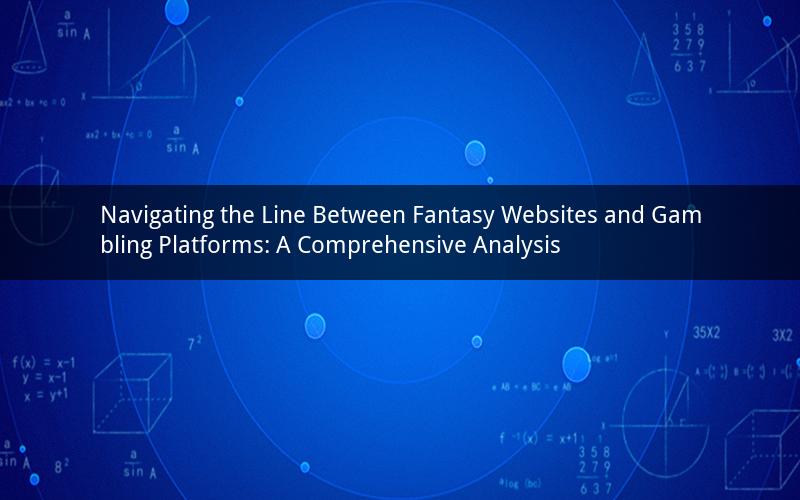
Introduction:
In recent years, the popularity of fantasy websites has surged, offering a unique blend of entertainment and competition. However, the blurred lines between fantasy websites and gambling platforms have sparked a heated debate. This article delves into the intricacies surrounding the classification of a fantasy website as a gambling website, exploring the legal implications, ethical concerns, and societal impacts.
I. Understanding Fantasy Websites:
1. Definition and Purpose:
Fantasy websites are online platforms that allow users to engage in virtual games, often centered around sports, entertainment, or other competitive activities. Participants create virtual teams or individual profiles and compete against others based on real-world events or outcomes. The primary goal is to provide a fun and engaging experience, fostering community and camaraderie among users.
2. Types of Fantasy Websites:
a. Sports Fantasy Websites: These platforms enable users to draft and manage virtual teams of real-life athletes from various sports leagues. Users compete based on the performance of their teams, earning points based on real-game statistics.
b. Entertainment Fantasy Websites: These platforms revolve around popular entertainment industries such as movies, television shows, or music. Users create and manage virtual casts or teams, competing based on the performance of real actors or musicians.
c. General Fantasy Websites: These platforms encompass a wide range of themes, including historical events, literature, and more. Users create virtual entities or characters and compete based on various criteria.
II. Differentiating Fantasy Websites from Gambling Platforms:
1. Purpose and Motivation:
The core distinction between fantasy websites and gambling platforms lies in the motivation behind participation. While gambling platforms primarily aim to generate profit through bets and wagers, fantasy websites focus on entertainment and social interaction. Users on fantasy websites compete for the thrill of competition and the enjoyment of the game, rather than financial gain.
2. Randomness and Skill:
Fantasy websites typically rely on real-world events or outcomes to determine the performance of virtual teams or individuals. This introduces an element of randomness, as users cannot control the real events that influence their scores. In contrast, gambling platforms often involve chance-based elements, where outcomes are determined solely by luck.
3. Financial Transactions:
While some fantasy websites may offer in-game purchases or subscriptions, the primary aim is not to generate substantial financial profit. These transactions are often considered optional and do not directly influence the outcome of the game. In contrast, gambling platforms heavily rely on financial transactions, where users place bets with the intent of winning money.
III. Legal Implications:
1. Classification as a Gambling Website:
The classification of a fantasy website as a gambling website largely depends on the jurisdiction and the specific laws and regulations in place. Some countries may consider fantasy websites as gambling due to their financial transactions or the potential for financial gain. However, many jurisdictions recognize the distinct nature of fantasy websites and classify them separately.
2. Legal Challenges:
Fantasy websites face legal challenges, primarily related to gambling laws and regulations. Proving that a fantasy website is purely for entertainment purposes and lacks the element of chance can be challenging. Legal battles often arise when there is a fine line between entertainment and gambling.
IV. Ethical Concerns:
1. Addiction and Responsible Gambling:
One of the major ethical concerns surrounding fantasy websites is the potential for addiction and responsible gambling practices. While fantasy websites are not designed to encourage gambling behavior, the presence of financial transactions and the potential for addiction cannot be ignored. It is crucial for users to maintain a healthy balance and be aware of the risks associated with any form of gambling.
2. Fairness and Transparency:
Ensuring fairness and transparency in fantasy websites is essential. This includes maintaining a level playing field, ensuring accurate and reliable data, and addressing any potential biases or discrepancies. Ethical considerations also involve protecting user data and privacy, as well as promoting a positive and inclusive community.
V. Societal Impacts:
1. Economic Impact:
Fantasy websites have the potential to contribute significantly to the economy. They generate revenue through advertising, partnerships, and user subscriptions. Additionally, they create job opportunities within the industry, from website development to marketing and customer support.
2. Social Impact:
Fantasy websites foster a sense of community and camaraderie among users. They provide a platform for social interaction, allowing individuals to connect and share their passion for sports, entertainment, or other interests. This can lead to the development of friendships and networking opportunities.
Questions and Answers:
1. Can a fantasy website be considered a gambling website if it involves real money transactions?
Answer: The classification depends on the jurisdiction and the specific laws and regulations in place. Some jurisdictions may consider it gambling, while others may view it as a separate form of entertainment.
2. Are there any legal implications for users who participate in fantasy websites?
Answer: Legal implications vary by jurisdiction. While users generally face minimal legal risks, it is important to be aware of any restrictions or regulations that may apply to their specific location.
3. How can fantasy websites promote responsible gambling practices?
Answer: Fantasy websites can implement measures such as age verification, responsible gaming policies, and resources for users to seek help if they believe they may have a gambling problem.
4. Can fantasy websites be addictive?
Answer: Like any form of entertainment, there is a potential for addiction. It is important for users to maintain a healthy balance, set limits, and be aware of the risks associated with excessive participation.
5. How do fantasy websites contribute to society?
Answer: Fantasy websites contribute to society by fostering community, providing entertainment, and generating economic benefits. They also create job opportunities and contribute to the growth of the entertainment and sports industries.